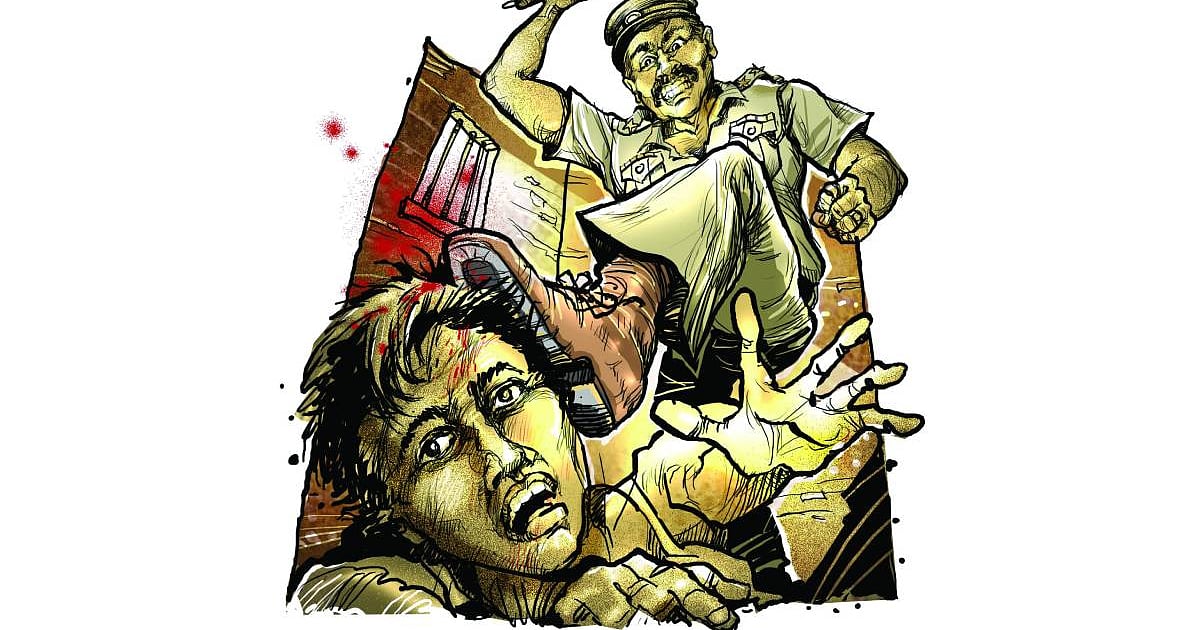 |
|
The tragic death of 25-year-old Makhan Din in Jammu and Kashmir's Kathua district has sparked outrage and raised serious concerns about alleged police brutality. Makhan Din, a member of the Gujjar community, died by suicide after consuming insecticides. However, before his death, he recorded a video that has gone viral, detailing a harrowing account of alleged torture at the hands of the police. This video serves as crucial evidence, potentially exposing a pattern of abuse and highlighting the urgent need for a thorough and transparent investigation. The video, recorded in a mosque, shows Makhan Din visibly distressed and emotionally shaken. He solemnly swears by Almighty and Prophet Muhammad (PBUH) to the truthfulness of his claims, emphasizing the gravity of his accusations and adding an undeniable emotional weight to his testimony. His words paint a picture of relentless physical and psychological abuse, designed to coerce a confession. He explicitly states that he was beaten until he fabricated a story to appease his interrogators, a story that contradicted the truth that he had never encountered militants. This fabricated confession, coerced under duress, underscores the deeply troubling implications of the alleged police misconduct.
Makhan Din's statement in the video reveals a chilling pattern of police tactics. He recounts how the police accused him of being an Over Ground Worker (OGW) and relentlessly interrogated him. The relentless pressure and physical assault led him to eventually fabricate a false story involving militants and his uncle, who has been exfiltrated to Pakistan. The fact that he only ceased being beaten after providing this false narrative strongly suggests that the police were less interested in obtaining truthful information and more interested in securing a confession, regardless of its accuracy. This revelation sheds light on the potential systematic use of torture to extract confessions, a deeply concerning practice that undermines the principles of justice and human rights. His willingness to record a video confession of his fabricated story, then to commit suicide, suggests a profound level of despair and desperation born out of this experience.
The incident has raised critical questions about the accountability of law enforcement agencies in Jammu and Kashmir. The surfacing of the video has intensified calls for a comprehensive investigation into the alleged police misconduct. It is imperative that the authorities conduct a thorough and impartial probe to ascertain the facts of the case and to bring those responsible to justice. If the allegations of torture are substantiated, it would represent a serious breach of human rights and a gross violation of the principles of due process. Furthermore, it is crucial to investigate whether this alleged incident is an isolated case or indicative of a larger pattern of human rights abuses within the law enforcement system. The video itself serves as powerful evidence, and independent oversight bodies should be involved in the investigation to ensure transparency and objectivity. The death of Makhan Din underscores the pressing need for reforms within the law enforcement system to prevent similar tragedies in the future. Robust mechanisms for accountability and mechanisms to prevent such egregious abuses are critical for building public trust and ensuring that justice prevails.
Beyond the immediate need for a thorough investigation and accountability, this incident highlights broader systemic issues within the criminal justice system in the region. The power dynamics at play, where a young man is subjected to relentless torture at the hands of law enforcement, must be examined critically. The deeply ingrained culture of impunity that may allow such abuses to go unchecked necessitates a fundamental shift in approach. Transparency and accountability are not just legal requirements; they are essential elements for fostering trust and confidence in the institutions tasked with upholding the rule of law. This incident serves as a stark reminder of the human cost of impunity and the urgent need to establish effective mechanisms to protect vulnerable populations from similar abuses. The video's viral spread underscores the public's demand for justice and accountability. The lack of timely response to such allegations erodes public confidence in the integrity of the system and could exacerbate existing tensions. The government must demonstrate its commitment to upholding the rule of law and protecting the rights of its citizens through a decisive and transparent investigation.
The global community also has a role to play in ensuring accountability for human rights abuses, particularly in conflict-affected regions. International human rights organizations should monitor the situation closely and engage with Indian authorities to urge a thorough and transparent investigation, ensuring that victims and their families receive justice. International pressure can provide a vital check on impunity and contribute to preventing future human rights violations. The case of Makhan Din's tragic death calls for collective action to address the broader issues of police brutality, torture, and lack of accountability within law enforcement systems worldwide. It serves as a chilling reminder of the importance of upholding human rights and ensuring that all individuals are treated with dignity and respect, regardless of their background or circumstances. The failure to address such issues will only perpetuate cycles of violence and injustice. The need for systemic reforms, both locally and internationally, is undeniable.
Source: Youth dies by suicide after alleged police torture in J&K; video recorded before death surfaces
